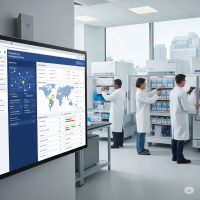Renal Cell Carcinoma FFPE Tissue Blocks: Advancing Cancer Research

Strong 8k brings an ultra-HD IPTV experience to your living room and your pocket.
Renal cell carcinoma FFPE tissue blocks are revolutionizing the way scientists approach kidney cancer research. These preserved tissue samples provide critical insights into tumor biology, treatment response, and biomarker discovery. With the increasing global burden of renal cell carcinoma (RCC), these formalin-fixed paraffin-embedded (FFPE) samples have become indispensable for researchers and pharmaceutical companies alike.
Understanding Renal Cell Carcinoma
Renal cell carcinoma is the most common type of kidney cancer in adults, accounting for approximately 90% of all kidney malignancies. RCC originates in the renal cortex and often presents asymptomatically in the early stages. Diagnosis typically occurs through imaging techniques or incidental findings. Despite advances in surgical techniques and targeted therapies, metastatic RCC remains challenging to treat, with a five-year survival rate significantly lower than for localized RCC.
To understand the molecular and histological characteristics of RCC, researchers rely heavily on tissue samples. Among the most valuable are renal cell carcinoma FFPE tissue blocks, which offer a stable and accessible source of biological material for diverse research applications.
What Are FFPE Tissue Blocks?
Formalin-fixed paraffin-embedded (FFPE) tissue blocks are created by preserving biological tissues using formalin fixation followed by embedding in paraffin wax. This method protects the tissue's cellular structure and morphology, allowing long-term storage without significant degradation.
Renal cell carcinoma FFPE tissue blocks are harvested from RCC patients during biopsy or surgical resection. After fixation and embedding, the samples are sliced into thin sections for microscopic examination or nucleic acid extraction. These preserved tissues retain crucial histopathological details that are essential for accurate diagnosis and research.
Applications of Renal Cell Carcinoma FFPE Tissue Blocks
1. Histopathological Studies
FFPE tissue blocks allow pathologists to examine tumor architecture, cell morphology, and grade. Renal cell carcinoma FFPE tissue blocks help differentiate between RCC subtypes such as clear cell, papillary, and chromophobe, guiding prognosis and treatment strategies.
2. Molecular and Genetic Analysis
Researchers extract DNA, RNA, and proteins from renal cell carcinoma FFPE tissue blocks to study gene mutations, expression profiles, and epigenetic changes. Despite the cross-linking caused by formalin, advancements in molecular techniques like qPCR and next-generation sequencing (NGS) have improved nucleic acid recovery from FFPE samples.
3. Biomarker Discovery
Identifying novel biomarkers for early diagnosis, prognosis, or treatment response is a major goal of cancer research. Renal cell carcinoma FFPE tissue blocks provide a rich resource for identifying protein or gene expression patterns associated with tumor progression or drug resistance.
4. Immunohistochemistry (IHC)
IHC techniques are frequently used to detect specific antigens in tissue samples. Renal cell carcinoma FFPE tissue blocks are ideal for IHC studies, enabling researchers to localize proteins such as PD-L1, VEGF, and CAIX, which are implicated in RCC pathology and therapy.
5. Drug Development and Validation
Pharmaceutical companies utilize renal cell carcinoma FFPE tissue blocks to assess the efficacy and specificity of new therapeutic agents. Validating drug targets in actual human tissue enhances translational research and accelerates clinical trial development.
Advantages of Using FFPE Samples in RCC Research
Renal cell carcinoma FFPE tissue blocks offer several key benefits:
Long-term stability: Samples can be stored for years without significant loss of histological detail.
High availability: FFPE samples are widely available through biobanks and pathology archives.
Cost-effective: Compared to fresh or frozen tissues, FFPE samples are easier and less expensive to store and handle.
Compatibility: Suitable for multiple analytical platforms including microscopy, IHC, and molecular assays.
Limitations and Challenges
Despite their utility, renal cell carcinoma FFPE tissue blocks come with some limitations:
Degradation of nucleic acids: Formalin fixation may cause fragmentation and cross-linking of DNA/RNA, complicating extraction.
Batch variability: Inconsistent fixation times and conditions can affect downstream analysis.
Antigen masking: Some proteins may be altered or masked during fixation, affecting antibody binding in IHC.
However, with standardized protocols and advanced retrieval techniques, these challenges are increasingly being mitigated.
Sourcing Renal Cell Carcinoma FFPE Tissue Blocks
Researchers can obtain renal cell carcinoma FFPE tissue blocks from reputable biobanks, tissue repositories, and commercial suppliers. Ethical sourcing, proper patient consent, and adherence to regulatory guidelines (like HIPAA or GDPR) are essential when acquiring human tissue samples for research.
When selecting a supplier, consider:
Sample quality and integrity
Clinical and pathological data availability
Annotation with patient demographics and treatment history
Compliance with international biospecimen standards
The Future of RCC Research with FFPE Tissues
As precision medicine continues to evolve, the demand for high-quality renal cell carcinoma FFPE tissue blocks will only increase. These tissue blocks enable retrospective studies, large-scale biomarker validation, and personalized therapy development. Integration with AI-based pathology and spatial transcriptomics is further expanding the potential of FFPE-based research.
In conclusion, renal cell carcinoma FFPE tissue blocks represent a cornerstone in the fight against kidney cancer. By offering a bridge between clinical practice and laboratory research, they provide the biological context necessary for groundbreaking discoveries. As technology improves, the value of these samples will grow, empowering researchers to unlock the complexities of renal cancer and ultimately improve patient outcomes.
Note: IndiBlogHub features both user-submitted and editorial content. We do not verify third-party contributions. Read our Disclaimer and Privacy Policyfor details.


